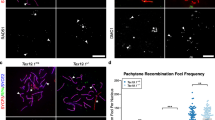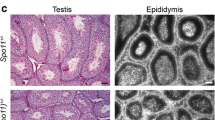Abstract.
There is accumulating evidence that meiosis, like mitosis, is monitored by a number of checkpoints. In mammals, the presence of asynapsed chromosomes at pachytene triggers a checkpoint (the pachytene or synapsis checkpoint) that removes cells via a p53-independent apoptotic pathway. In the special case of the sex bivalent in males, it is pseudoautosomal region (PAR) asynapsis that triggers the checkpoint. In male mice with three sex chromosomes (XYY or XYY*X) some pachytene spermatocytes achieve full (trivalent) PAR synapsis, but in many cells one sex chromosome remains as a univalent, thus triggering the checkpoint. Sperm counts in these males have been shown to be positively correlated with trivalent frequencies. In the present study sperm production and levels of sex chromosome synapsis were studied in mice with four sex chromosomes (XYYY*X and XYY*XY*X). These mice proved to be more severely affected than XYY or XYY*X mice. Nevertheless, pachytene synaptonemal complex analysis revealed that full PAR synapsis was achieved through the formation of radial quadrivalents or through the formation of two sex bivalents in 21%–49% of cells analysed. Given these levels of full PAR synapsis, the sperm counts were consistently lower than would have been predicted from the relationship between levels of PAR synapsis and sperm counts in mice with three sex chromosomes. It has been suggested that the inactivation of the asynapsed non-PAR X and Y axes of the XY bivalent of normal males (MSCI), which occurs during meiotic prophase, may be driven by Xist transcripts originating from the X. If this is the case, the non-PAR Y axes of YY and YY*X bivalents would fail to undergo MSCI. This could be cell lethal, either because of 'inappropriate' Y gene expression, or because the non-PAR Y axis may now trigger the synapsis checkpoint.
Similar content being viewed by others
Author information
Authors and Affiliations
Additional information
In revised form: 15 January 2001
Electronic Publication
Rights and permissions
About this article
Cite this article
Rodriguez, T.A., Burgoyne, P.S. Spermatogenic failure in male mice with four sex chromosomes. Chromosoma 110, 124–129 (2001). https://doi.org/10.1007/s004120100134
Received:
Accepted:
Issue Date:
DOI: https://doi.org/10.1007/s004120100134




